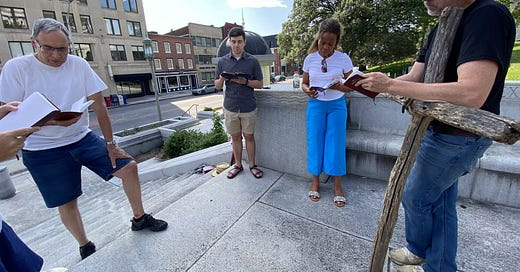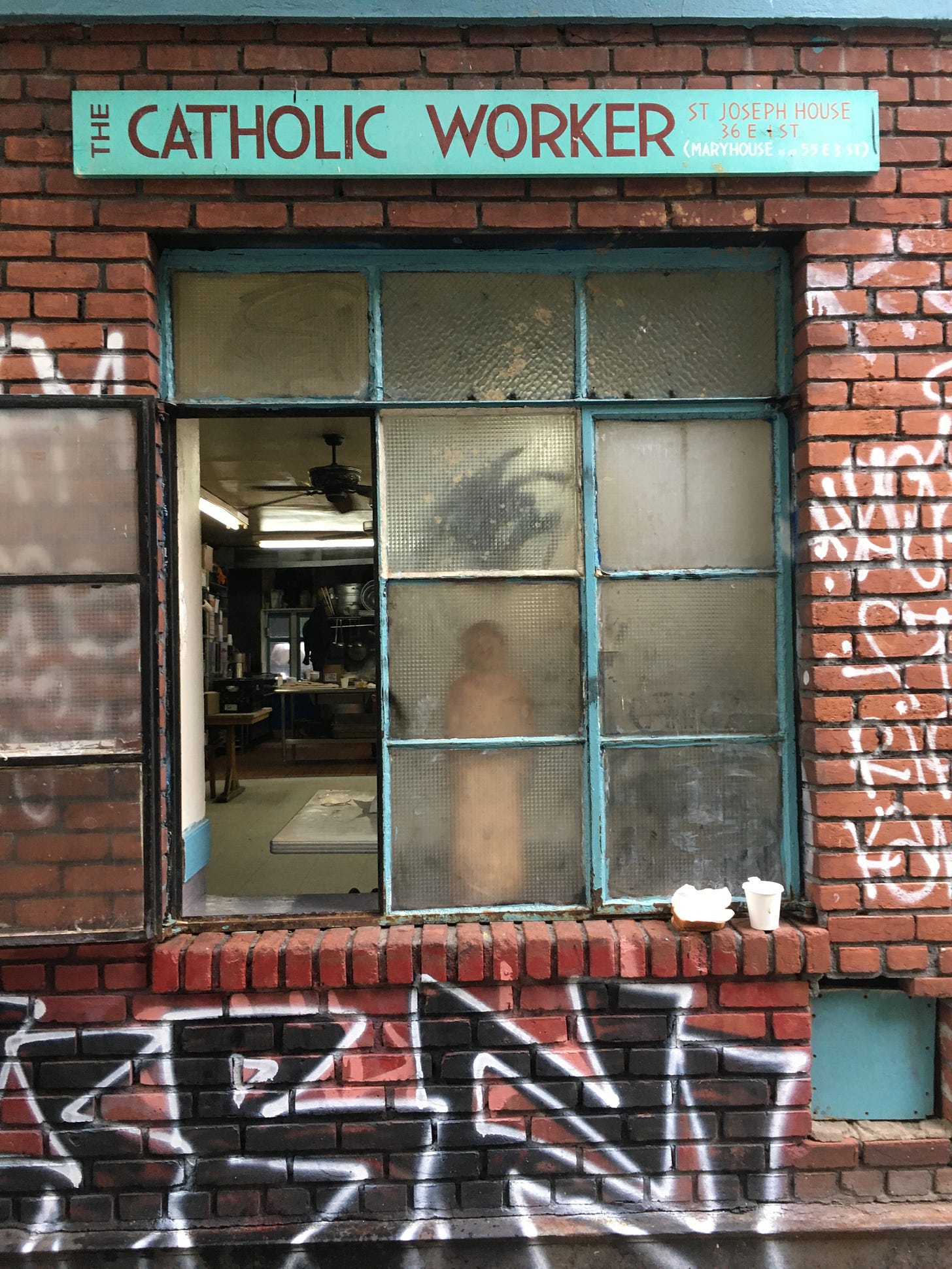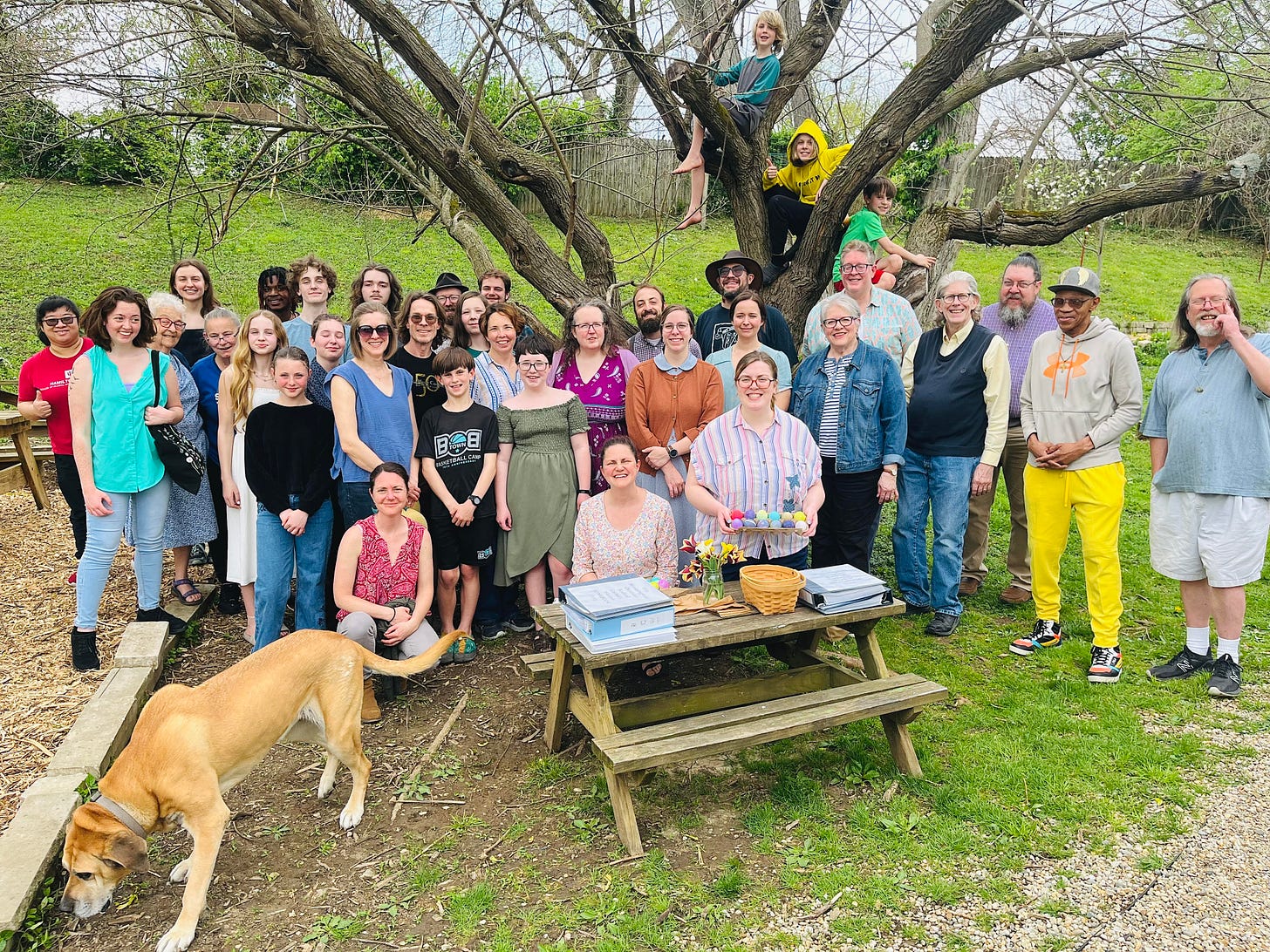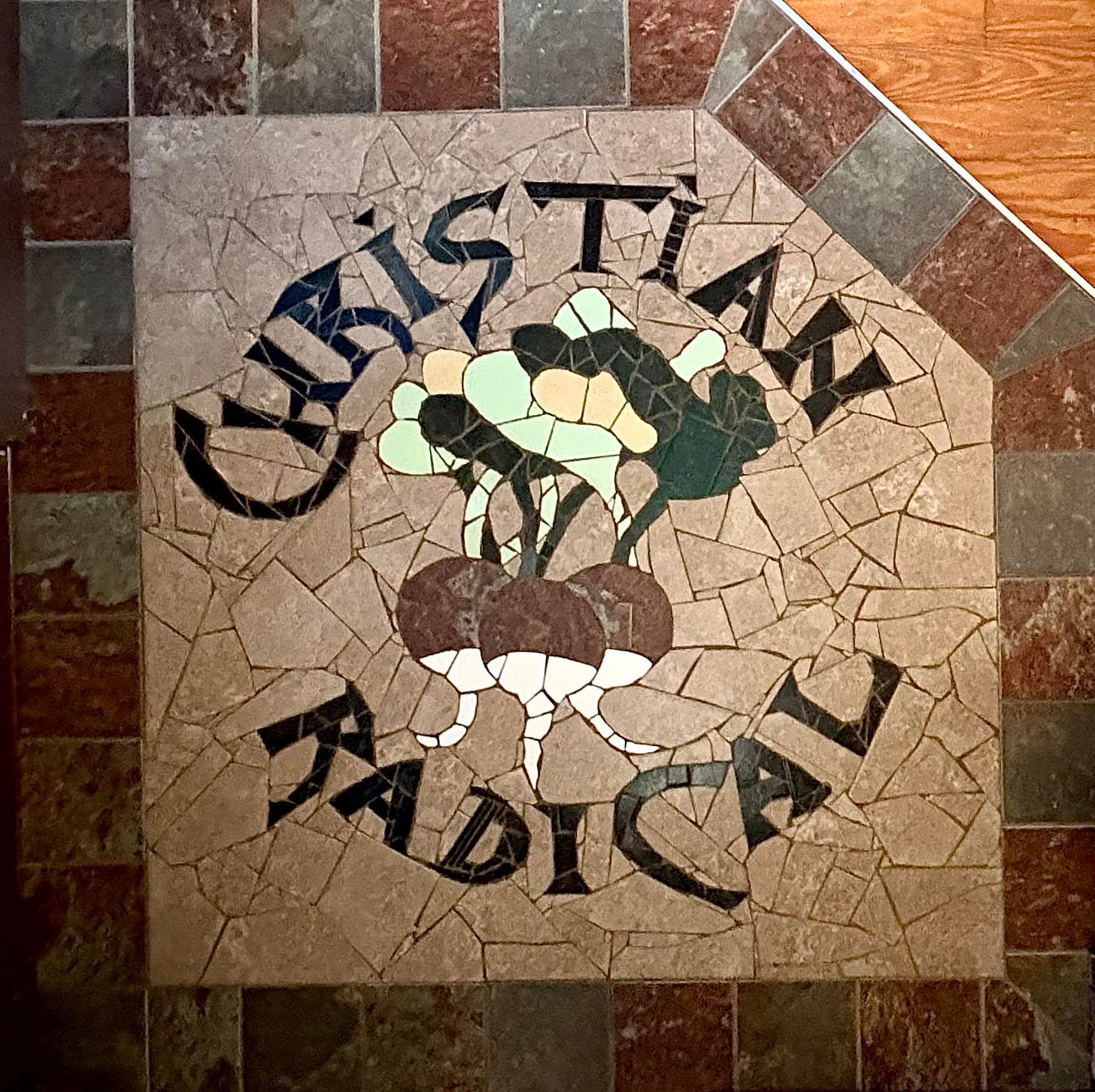Works of Peace Chart the Future
Who will you find at the Catholic Worker? Harry Murray has the answers; Open Door community decries the (in)justice system and the D.C. Catholic Worker calls for peace & monarchs only for butterflies

“There are no ‘distant’ conflicts.”
On Saturday, June 21 (after Roundtable was written and scheduled), news broke that the United States had dropped a dozen 30,000-pound “bunker buster” bombs on two sites in Iran and struck another with Tomahawk missiles. The administration claimed these sites were part of Iran’s nuclear weapons program.
While Catholic commentators have attempted to defend these airstrikes, Pope Leo XIV said the next day, hours after the strikes were completed: “War does not solve problems.” In his Angelus address in St. Peter’s Square, he continued:
Today more than ever, humanity cries out and calls for peace. This is a cry that requires responsibility and reason, and it must not be drowned out by the din of weapons or the rhetoric that incites conflict. Every member of the international community has a moral responsibility to stop the tragedy of war before it becomes an irreparable chasm. There are no “distant” conflicts when human dignity is at stake.
War does not solve problems; on the contrary, it amplifies them and inflicts deep wounds on the history of peoples, which take generations to heal. No armed victory can compensate for the pain of mothers, the fear of children, or stolen futures.
Human dignity is a global solidarity—there are no “distant” conflicts in the mystical body of Christ. Dorothy Day wrote similarly when the United States dropped atomic bombs on Hiroshima and Nagasaki in 1945.
In her searing editorial about the dropping of the atomic bomb, Dorothy Day meditates on how the dust of the vaporized citizens of Hiroshima and Nagasaki had been scattered to the four winds, had traveled all around the world, “perhaps we will breathe their dust into our nostrils, feel them in the fog of New York on our faces, feel them in the rain on the hills of Easton,” she wrote.
Day’s image viscerally brings to life the doctrine of the Mystical Body of Christ—that our suffering is all “one of another, knowing that when “the health of one member suffers, the health of the whole body is lowered,” she wrote in 1940.
Last Sunday, St. Martin De Porres Catholic Worker gathered a small group of Catholics and Anabaptists on the steps of the Pennsylvania State Capitol here in Harrisburg to pray for peace. Although it seems that a handful of little people praying vespers together does not do much for world peace, I wonder if overcoming small divisions—in our denominations, in our languages—is a practice of unity that helps us practice that unity of peace on a much more global scale.
The language of peace, of unity, that Pope Leo and Dorothy Day employ is so different than the language of alienation, of demonization that colors even many Catholics’ rhetoric about Iran. And where else do we practice that peace than today, reaching over a division—however big, however small—between us and our neighbor and declaring our unity?
peace,
Renée
FEATURED
It Takes All Sorts to Make a Catholic Worker
On Thursday, CW Reads shared another section of the chapter on St. Joseph’s House of Hospitality in New York City from Harry Murray’s “Do Not Neglect Hospitality.” (You can subscribe to CW Reads, Roundtable’s long-form essays emailed once or twice a week, here.)
In this section, Murray details the different ways Catholic Workers type the different people who visit and live at the house. He observes the way in which Catholic Worker communities leave room for each person to be a full person and also sort themselves into different roles or identities. He writes:
There really was no resident "role"—each resident negotiated his or her own role. Harvey's role was akin to that of a resident of a nursing home, although with a bit less systematized care, a lot more freedom, and far more genuine love. Helen created a role in which, for all that she may have been disgruntled with status differentials or the way the house was run, she knew that she was contributing something valuable to the house. Hers was not an artificial dignity created for her by the staff of a nursing home. She had an important role in the overall functioning of the house and she knew it.
Treating the residents as a group does reveal the role of reciprocity in Worker hospitality. Reciprocity is gratefully accepted but not required in return for hospitality. One need not reciprocate to remain a resident.
Read more of the chapter here.

A Culture of Death in Georgia
On Friday, CW Reads shared two essays from Hospitality, the newspaper of the Open Door Community in Baltimore. These essays are heart-rending stories of grappling with the injustices of the punishments our neighbors endure at the hands of the carceral state.
The first essay tells the story of Willie James Pye’s execution last year and the passionate organizing that coalesced in the aftermath. The second tells the tragic story of Kenyatta Booze, who recently died after being denied admittance to rehab facilities.
In fact, since July 5, 2023, the 58-year-old Mr. Booze has spent a total of 531 pretrial days in our jail. He’s been arrested more than a dozen times over the past 20 months, all arrests alleging he committed misdemeanor offenses. He’s been busted for trespassing in our parks, in a local drug store’s parking lot (a half-dozen times), behind a grocery store (where he was sleeping in a shed), outside a chiropractor’s office (where he was using a garden hose to wash himself). Back in September 2023, Mr. Booze committed his most serious misdemeanor crime, shoplifting, after he went into Walmart and attempted to walk out with “Payday candy bars, a package of Snickers, Blow-Pops, a Coke Zero, Reese’s Peanut Butter Cups, a pair of socks, blue jeans and earbuds.”
Kenyatta Booze has been in jail more than out over the past several years. When he’s out, I’ve managed to spend time with him whenever I provide transportation to his courthouse hearings, or visit with him on the streets
of Athens. He has two adult children. He played football in high school. He drove 18-wheelers for a living. I’ve also gotten to know Mr. Booze’s 83-year-old mother, Dorothy Griffin, who lives an hour away in Lawrenceville but still has managed to get to Athens to attend some of his court hearings.“My son is not a criminal,” Ms. Griffin told me. “Something happened to him several years ago, and he’s not right anymore. He’s never been like this.” Dorothy Griffin is convinced that her son needs neurological treatment in an appropriate care facility. “Just to look at him and to hear him speak should be obvious to anyone that Kenyatta isn’t right,” she said. “He has a hard time putting a sentence together now. He stumbles when he walks, and his hands and arms are always flailing about. When he’s sitting, his head jerks back and forth.”
But try telling any of this to the court officials in Athens, Georgia. Three months ago, on January 6, 2025, Mr. Booze appeared at a misdemeanor court status hearing. He’d been in jail over four months this time around, again charged with trespassing at the local grocery store.
COMMUNITY NEWS & NEWSLETTERS
Bloomington Catholic Worker Closes a Chapter
In its final newsletter, the Bloomington Christian Radical Catholic Worker Community announced that its founders will be departing after seventeen years of offering hospitality to the homeless. Co-founders Ross and Andrea Martinie Eiler will be joining the Maple Ridge Bruderhof community in August.
The Bloomington Catholic Worker will be hosting roundtable discussions throughout the 2025–26 academic year about a future Catholic Worker-style ministry in Bloomington at the former Christian Radical’s House. Interested folks can contact Kyla Wargel or Chris Colvard at bloomingtoncw@gmail.com.
A farewell Celebration and Grieving is planned for July 24 at 7 p.m. at the Bloomington Catholic Worker houses.
Martha Hennessy Speaks in Paris
Martha Hennessy traveled to Paris to attend the gallery exhibition of “Dorothy Day: Changing the Social Order” and speak at Le Dorothy Café in Paris. Jerry Windley-Daoust wrote about the gallery opening for Roundtable last month. Artist Francois Rieux shared some photos of Martha’s visit on his Instagram page, below:
D.C. Peace Vigil Calls on U.S. to Stop Starving Gaza
Art Laffin shared the news from the Dorothy Day Catholic Worker’s peace vigil outside the White House on June 20.
Upon arrival, there was a prayer service already in progress focusing on World Refugee Day, which several of us joined. At the conclusion of this prayer service, we invited two friends who were present for the service to join the DDCW vigil. The main focus of the vigil was to call for No U.S. Military Attack and War Against Iran and that the U.S. demand that Israel stops bombing Iran. […] We also called for an end to the U.S.—backed Israeli genocidal war in Gaza.
Romero Catholic Worker Publishes Third Volume of “Radix”
In their June edition of Radix, Romero Catholic Worker, in Wichita, Kansas, meditates on a common Catholic Worker encounter: encountering Lazarus on the doorstep—in this case, outside a QuikTrip gas station. They reprint Peter Maurin’s “Tradition or Catholic Action” and Dorothy Day’s manifesto contra tax exemption. Will Mohr continues his series on personalist economics, Mattie Jenkins shares updates on the garden, her series on farming as an altar, and a meditation on the pearl of great price: persimmons! Poetry by Maggie Gann on the case for canonization of “a New York Queen and nicotine fiend.” Read online and subscribe here.
CW IN THE MEDIA
D.C. Catholic Worker Protests Military Idolatry
Art Laffin wrote a blog post about Dorothy Day Catholic Worker’s June 14 witness for Pax Christi USA. In solidarity with the No Kings protests around the country, several of the Catholic Worker community members in Washington D.C. displayed protest signs that read: “Real kings don’t need tanks” with an image of Jesus on a donkey entering Jerusalem; “Monarch butterflies, not presidents!” and “Follow Jesus’ way of nonviolence,” according to Laffin. Read the full post here.
Iowa City Catholic Worker Protests Medicaid Cuts
A local ABC-affiliate news station in Iowa reported that the Iowa City Catholic Worker was part of a group of around 100 who protested the cuts to Medicaid in Trump’s spending bill and its increase of funding for ICE detentions outside of the Federal Courthouse in Cedar Rapids, Iowa. The outlet reported that a small group delivered a letter with their concerns to Senator Joni Ernst’s office inside the courthouse. Ernst recently responded to concerns about Medicaid cuts — 44% of children in Iowa are on public healthcare—by saying, “Well, we’re all going to die.” Read the full story here.
Strangers and Guests Community Celebrates the Summer Solstice
Writer Sarah Scull shares the story of a visit to Strangers and Guests in Maloy, Iowa, celebrating a Solstice celebration on the very day that Iran was bombed. She writes:
As the sun started to set, and bombs lit up a sky far away, we lit our own fire. It was smaller than any explosion on the news, but somehow felt bigger. Because it wasn’t about destruction, it was about tradition. Resilience. Light. Love.
MARK YOUR CALENDAR
Long Loneliness Book Club
The Dorothy Day Guild is sponsoring a book club reading The Long Loneliness over the course of six Sunday evenings, starting Sunday, June 29, from 8 p.m. to 9 p.m. Eastern Time and continuing until Sunday, August 3. You can register for the book club using this form.
Dandelion House Sponsors “The Fierce Nonviolence Pilgrimage”
Dandelion House (Portland, Oregon) is hosting an 11-day immersion for young adults this summer focused on the people and places in the Pacific Northwest impacted by the U.S. nuclear arsenal.
The 2025 Fierce Nonviolence Pilgrimage is an immersive experience exploring the spiritual roots and daily practices of nonviolent social change. The pilgrimage integrates political organizing strategies with spiritual reflection and community living. Participants will engage in contemplative practices, hands-on organizing training, and site visits to Spokane, Hanford, and Seattle/Puget Sound. The pilgrimage runs July 28 – August 7; get more details at the Fierce Nonviolence website.
WORDS FROM THE ELDERS
“We Go on Record”
by Dorothy Day, from the September 1945 issue of The Catholic Worker
That is, we hope we have killed them, the Associated Press, on page one, column one of the Herald Tribune, says. The effect is hoped for, not known. It is to be hoped they are vaporized, our Japanese brothers— scattered, men, women and babies, to the four winds, over the seven seas. Perhaps we will breathe their dust into our nostrils, feel them in the fog of New York on our faces, feel them in the rain on the hills of Easton.
Jubilate Deo. President Truman was jubilant. We have created. We have created destruction. We have created a new element, called Pluto. Nature had nothing to do with it.
Read Dorothy Day’s full column here.










